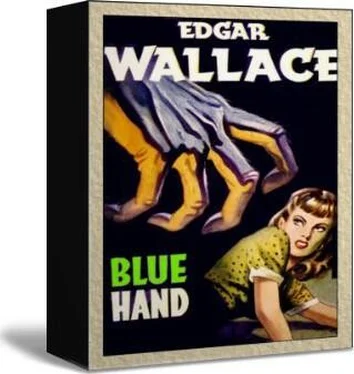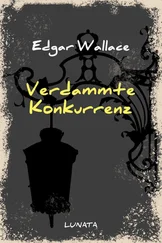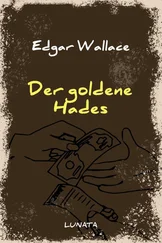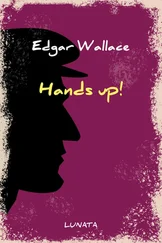Edgar Wallace - Blue Hand
Здесь есть возможность читать онлайн «Edgar Wallace - Blue Hand» весь текст электронной книги совершенно бесплатно (целиком полную версию без сокращений). В некоторых случаях можно слушать аудио, скачать через торрент в формате fb2 и присутствует краткое содержание. Год выпуска: 0101, Жанр: Старинная литература, на английском языке. Описание произведения, (предисловие) а так же отзывы посетителей доступны на портале библиотеки ЛибКат.
- Название:Blue Hand
- Автор:
- Жанр:
- Год:0101
- ISBN:нет данных
- Рейтинг книги:3 / 5. Голосов: 1
-
Избранное:Добавить в избранное
- Отзывы:
-
Ваша оценка:
- 60
- 1
- 2
- 3
- 4
- 5
Blue Hand: краткое содержание, описание и аннотация
Предлагаем к чтению аннотацию, описание, краткое содержание или предисловие (зависит от того, что написал сам автор книги «Blue Hand»). Если вы не нашли необходимую информацию о книге — напишите в комментариях, мы постараемся отыскать её.
Blue Hand — читать онлайн бесплатно полную книгу (весь текст) целиком
Ниже представлен текст книги, разбитый по страницам. Система сохранения места последней прочитанной страницы, позволяет с удобством читать онлайн бесплатно книгу «Blue Hand», без необходимости каждый раз заново искать на чём Вы остановились. Поставьте закладку, и сможете в любой момент перейти на страницу, на которой закончили чтение.
Интервал:
Закладка:
“I don’t quite understand you, Jackson,” she said coldly. “What is the joke that somebody was having, and why do you ask me if I was disturbed? Did anything happen in the night?”
The man nodded.
“Somebody was in the house,” he said, “and it is a wonder that Mr. Groat didn’t hear it, because he was working in his laboratory. I thought perhaps you might have heard him searching the house afterwards.”
She shook her head. Had the Blue Hand been detected? she wondered.
“How do you know that a stranger was in the house?” she asked.
“Because he left his mark,” said the man grimly. “You know that white door leading to the laboratory, miss?”
She nodded.
“Well, when Mr. Groat came out about half-past two this morning he was going to turn out the hall lights when he saw a smudge of paint on the door. He went back and found that it was the mark of a Blue Hand. I’ve been trying to get it off all the morning, but it is greasy and can’t be cleaned.”
“The mark of a Blue Hand?” she repeated slowly and felt herself change colour. “What does that mean?”
“I’m blessed if I know,” said Jackson, shaking his head. “The governor doesn’t know either. But there it was as plain as a pike-staff. I thought it was a servant who did it. There is one under notice and she might have been up to her tricks, but it couldn’t have been her. Besides, the servants’ sleeping-rooms are at the back of the house, and the door between the front and the back is kept locked.”
So the mysterious visitor had not been satisfied with warning her. She had warned Digby Groat as well!
Eunice had nearly finished breakfast when Digby made his appearance. He was looking tired and haggard, she thought. He never looked his best in the early hours, but this morning he was more unprepossessing than usual. He shot a swift suspicious glance at the girl as he took his place at the table.
“You have finished, I’m afraid, Miss Weldon,” he said briefly. “Has Jackson told you what happened in the night?”
“Yes,” said Eunice quietly. “Have you any idea what it means?”
He shook his head.
“It means trouble to the person who did it, if I catch him,” he said; then, changing the conversation, he asked how his mother was that morning.
Eunice invariably called at Mrs. Groat’s room on her way down, and she was able to tell him that his mother was mending rapidly and had passed a very good night.
“She can’t get well too soon,” he said. “How did you sleep, Miss Weldon?”
“Very well,” she prevaricated.
“Have you tried my chocolates?” he smiled.
She nodded.
“They are beautiful.”
“Don’t eat too many at once, they are rather rich,” he said, and made no further reference either to that matter or to the midnight visitor.
Later in the morning, when she was going about her work, Eunice saw workmen engaged on cleaning the canvas door. Apparently the blue stain could not be eradicated, and after a consultation with Digby the canvas was being painted a dull blue colour.
She knew that Digby was perturbed more than ordinarily. When she had met him, as she had occasionally that morning, he had worn a furtive, hunted look, and once, when she had gone into his study to bring to his notice an account which she had unearthed, he was muttering to himself.
That afternoon there was a reception at Lord Waltham’s house in Park Lane, in honour of a colonial premier who was visiting England. Digby Groat found it convenient to cultivate the acquaintance of the aesthetic Lord Waltham, who was one of the great financial five of the City of London. Digby had gone cleverly to work to form a small syndicate for the immediate purchase of the Danton estate. The time had not yet come when he could dispose of this property, but it was fast approaching.
There were many women in that brilliant assembly who would have been glad to know a man reputedly clever, and certainly the heir to great wealth; but in an inverted sense Digby was a fastidious man. Society which met him and discussed him over their dinner-tables were puzzled by his avoidance of woman’s society. He could have made a brilliant marriage, had he so desired, but apparently the girls of his own set had no attraction for him. There were intimates, men about town, who were less guarded in their language when they spoke across the table after the women had gone, and these told stories of him which did not redound to his credit. Digby in his youth had had many affairs—vulgar, sordid affairs which had left each victim with an aching heart and no redress.
He had only come to “look in,” he explained. There was heavy work awaiting him at home, and he hinted at the new experiment he was making which would take up the greater part of the evening.
“How is your mother, Groat?” asked Lord Waltham.
“Thank you, sir, I think she is better,” replied Digby. He wanted to keep off the subject of his mother.
“I can’t understand the extraordinary change that has come over her in late years,” said Lord Waltham with a little frown. “She used to be so bright and cheerful, one of the wittiest women I have ever met. And then, of a sudden, all her spirits seemed to go and if you don’t mind my saying so, she seemed to get old.”
“I noticed that,” said Digby with an air of profound concern, “but women of her age frequently go all to pieces in a week.”
“I suppose there’s something in that. I always forget you’re a doctor,” smiled Lord Waltham.
Digby took his leave and he, too, was chuckling softly to himself as he went down the steps to his waiting car. He wondered what Lord Waltham would say if he had explained the secret of his mother’s banished brightness. It was only by accident that he himself had made the discovery. She was a drug-taker, as assiduous a “dope” as he had ever met in his professional career.
When he discovered this he had set himself to break down the habit. Not because he loved her, but because he was a scientist addicted to experiments. He had found the source of her supply and gradually had extracted a portion of the narcotic from every pellet until the drug had ceased to have its effect.
The result from the old woman’s point of view was deplorable. She suddenly seemed to wither, and Digby, whom she had ruled until then with a rod of iron, had to his surprise found himself the master. It was a lesson of which he was not slow to take advantage, every day and night she was watched and the drug was kept from her. With it she was a slave to her habit; without it she was a slave to Digby. He preferred the latter form of bondage.
Mr. Septimus Salter had not arrived when Jim had reached the office that morning, and he waited, for he had a great deal to say to the old man, whom he had not seen for the better part of the week.
When he did come, a little gouty and therefore more than a little petulant, he was inclined to pooh-pooh the suggestion that there was anything in the sign of the Blue Hand.
“Whoever the person is, he or she must have had the stamp by them—you say it looks like a rubber stamp—and used it fortuitously. No, I can’t remember any Blue Hand in the business. If I were you, I should not attach too much importance to this.”
Although Jim did not share his employer’s opinion he very wisely did not disagree.
“Now, what is this you wore telling me about a will? You say Mrs. Groat has made a new will, subsequent to the one she executed in this office?”
Jim assented.
“And left all her money away from the boy, eh?” said old Mr. Salter thoughtfully. “Curiously enough, I always had an idea that there was no love lost between that pair. To whom do you say the money was left?”
“To the Marquis of Estremeda.”
Читать дальшеИнтервал:
Закладка:
Похожие книги на «Blue Hand»
Представляем Вашему вниманию похожие книги на «Blue Hand» списком для выбора. Мы отобрали схожую по названию и смыслу литературу в надежде предоставить читателям больше вариантов отыскать новые, интересные, ещё непрочитанные произведения.
Обсуждение, отзывы о книге «Blue Hand» и просто собственные мнения читателей. Оставьте ваши комментарии, напишите, что Вы думаете о произведении, его смысле или главных героях. Укажите что конкретно понравилось, а что нет, и почему Вы так считаете.












